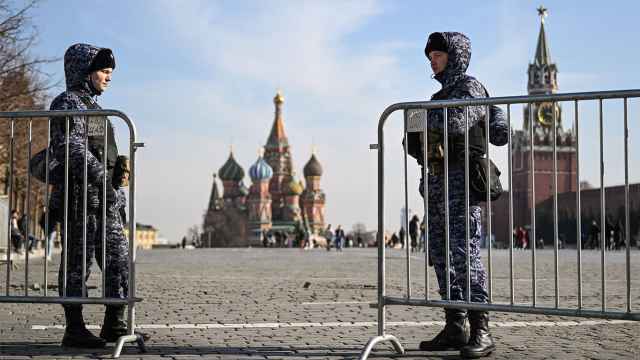A regional leader of A Just Russia died outside a Moscow hospital as his friends pleaded with a security guard to let them in, a senior party official said Wednesday.
Maxim Goloviznin, leader of the party's branch in the Sverdlovsk region, died of heart failure Friday outside the Vishnevsky Surgery Institute, one of the country's leading state hospitals, after doctors refused to admit him, the official, Mikhail Bryachak, said by telephone.
Federation Council Speaker Sergei Mironov said Goloviznin died suddenly but that did not absolve doctors of their responsibility to try to save him.
"He was only 40 years old. He suffered a massive heart attack," said Mironov, a senior Just Russia official who resigned as party leader at a congress Saturday, according to comments carried by Interfax.
He said the party had filed a complaint over the incident. He did not say with whom.
Goloviznin, who arrived in Moscow by train Friday to attend the weekend congress, began to feel ill as he was driving with friends from the train station, Bryachak said. So his friends made a beeline to the nearest hospital, Vishnevsky, he said.
What exactly happened next remains murky, and the Investigative Committee said Wednesday that it was striving to piece together the details.
But no one disputes that Goloviznin and his friends unsuccessfully called for help from a telephone at the security guard's post.
"Even though the victim had lost consciousness, the security guard refused to allow the men to enter the hospital, citing the fact that he was not brought in an ambulance," the Investigative Committee said in a statement.
Bryachak said the hospital official who answered the phone call refused to help, saying the hospital was "a non-core establishment" and "could not admit him right now."
Goloviznin's friends then called an ambulance — which took about 20 minutes to arrive, he said.
Paramedics from the ambulance pronounced Goloviznin dead, the Investigative Committee said.
It was only then that a doctor emerged from the hospital, Bryachak said. But the doctor, he said, only came out after a traffic police officer, who had followed Goloviznin's car to the hospital after it crossed into an oncoming lane in its rush for help, handcuffed the doctor to himself, led him out and ordered him to assist Goloviznin.
The hospital has offered contradictory explanations about what happened.
A spokesman, Grigory Krivtsov, said the law banned the hospital from admitting emergency cases and that an ambulance should have been called for Goloviznin at once, according to Ura.ru, the Sverdlovsk region news web site that first reported the death late Tuesday.
Krivtsov also said anti-terrorism laws banned vehicles that didn't belong to the hospital from entering its territory.
An unidentified doctor at the hospital told RIA-Novosti that the guard refused entry to Goloviznin's friends because an unspecified prosecutor had banned "unsanctioned access" to the hospital last month.
But the hospital's director, Valery Kubyshkin, said by telephone that the law requires the hospital staff to provide emergency assistance to anyone who seeks it — even at the guard post.
Kubyshkin added, however, that Goloviznin had been dead for "quite some time" before doctors were contacted.
"This is distressing for us as well, and we are trying to find out what happened," he said. "But we fail to see our guilt here."
He said preliminary information indicated that Goloviznin had suffered from severe heart disease.
Under the law, a person responsible for providing medical assistance who refuses it without reasonable cause can be punished by up to three years in prison if the patient dies.
The Vishnevsky Surgery Institute is an award-winning hospital located at 27 Bolshaya Serpukhovskaya Ulitsa just south of the Garden Ring and specializes in serious burn cases and complicated surgeries, according to its web site, Vishnevskogo.ru. Prime Minister Vladimir Putin visited the hospital in January after it admitted several people critically injured in the suicide bombing at Moscow's Domodedovo Airport.
Krivtsov, the hospital spokesman, said an internal investigation had been opened into the circumstances surrounding Goloviznin's death.
Bryachak said he hoped that the Investigative Committee would get to the bottom of what happened.
"We hope that investigators find the people responsible for this show of callousness, indifference and criminal negligence," he said.
A Message from The Moscow Times:
Dear readers,
We are facing unprecedented challenges. Russia's Prosecutor General's Office has designated The Moscow Times as an "undesirable" organization, criminalizing our work and putting our staff at risk of prosecution. This follows our earlier unjust labeling as a "foreign agent."
These actions are direct attempts to silence independent journalism in Russia. The authorities claim our work "discredits the decisions of the Russian leadership." We see things differently: we strive to provide accurate, unbiased reporting on Russia.
We, the journalists of The Moscow Times, refuse to be silenced. But to continue our work, we need your help.
Your support, no matter how small, makes a world of difference. If you can, please support us monthly starting from just $2. It's quick to set up, and every contribution makes a significant impact.
By supporting The Moscow Times, you're defending open, independent journalism in the face of repression. Thank you for standing with us.
Remind me later.





